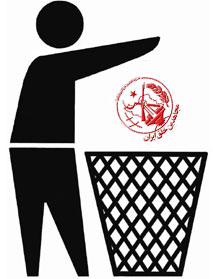|
Although UNHCR won’t require the dissidents to disassociate from the group, it said in a recent statement that refugee status could be granted only to individuals and not to the group as a whole. In effect, the MEK, appears to be on the verge of accepting the demand by U.S. Ambassador James Jeffrey in July to disband as a military formation. |

http://www.miamiherald.com/2011/10/02/2435371/iranian-dissidents-in-iraq-seek.html
More than 3,000 Iranian dissidents who’d been threatened with expulsion from Iraq on Dec. 31 have applied to the United Nations for refugee status, a move that could help clear up one of Iraq’s thorniest international problems from the era of dictator Saddam Hussein, U.N. and western diplomats said Sunday.
The U.N. High Commission for Refugees said it would review the 3,200 individual applications received in the last month from Iranian residents of Camp Ashraf, north of Baghdad, which has been run by the terrorist Mujahedin-e Khalq Organization (MEK).
Although UNHCR won’t require the dissidents to disassociate from the group, it said in a recent statement that refugee status could be granted only to individuals and not to the group as a whole. In effect, the MEK, appears to be on the verge of accepting the demand by U.S. Ambassador James Jeffrey in July to disband as a military formation.
The MEK had fought as a mechanized division in alliance with Saddam Hussein during the 1980-1988 war with Iran. But it was left stranded by the U.S. invasion in 2003 that toppled the dictator. Prime Minister Nouri al Maliki has called MEK a terrorist group and demanded that Ashraf be dismantled and its members deported by the end of the year.
Until recently, the MEK had insisted on group refugee status, but it shifted its stance in late August following talks between Struan Stevenson, a Scottish conservative in the European parliament, and UNHCR High Commissioner Antonio Guterres in Geneva.
The U.S. government has characterized MEK as a cult and designated it a terrorist group in 1997, holding it responsible for the assassinations of three U.S. Army officers and three civilian contractors prior to the Iranian revolution. With funding from the Iranian diaspora, the MEK has mounted a major campaign in the U.S. and Europe and enlisted many top national security figures from mostly from Republican administrations as well as a number of prominent Democratic politicians to get its terrorist designation lifted.
Meanwhile, Iran has renewed its offer to repatriate the residents of Ashraf or provide documents so they can resettle in third countries.
“We are sure that 65 to 70 percent of the people who are living in Ashraf camp are captive of the other members,” Iran’s ambassador to Iraq, Hasan Daniaei-Far, told McClatchy in a recent interview. “Let them be free, let them choose their own destiny.”
“In case he or she wishes to go back to Iran … we will provide the necessary documents. Even if they wish to go to a third country, we will provide them the necessary documents,” he said. He said hundreds who had already returned to Iran “are conducting a normal life.”
The ambassador also reiterated that Iran had issued a mass pardon to the MEK members except for about 100 who have criminal charges pending against them.
James Dobbins, a respected American diplomat now affiliated with the Rand Corp., a Pentagon-funded think tank, said a recent Rand study had concluded that most of the Camp Ashraf residents “were being held against their will” and said there was no information that those who’d returned to Iran had been harassed by the authorities. “Are they enjoying a normal life? There’s no information available to the contrary,” he said.
